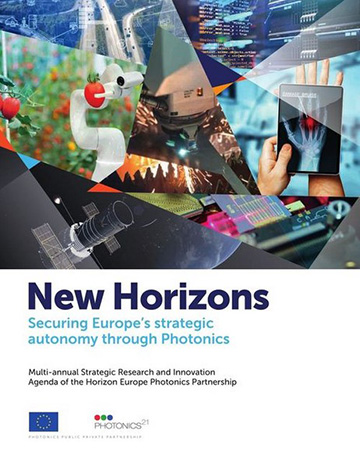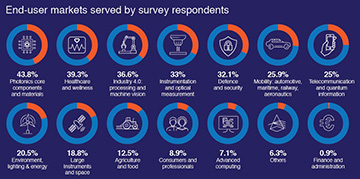
Photonics laboratory. [Image: Wladimir Bulgar / Science Photo Library / Getty Images]
In the runup to the 26–27 April annual meeting of the European Photonics Public-Private Partnership (PPP), the European “technology platform” Photonics21 issued two reports charting an ambitious future for photonics on the continent—and warning of a key challenge for meeting those goals.
The first of the two reports, the latest update of the organization’s periodically published multiyear strategic agenda, emphasizes the importance of advanced photonics across multiple strategic value chains in the European Union. It also cites some particularly important areas to nurture toward the overarching EU goal of “strategic autonomy.”
But the second report, summarizing the results of a late-2022 survey of 112 EU photonics companies, highlights a significant potential impediment to achieving that vision. The stumbling block in question is the overreliance of European photonics firms on overseas supply chains—the fickleness of which has been writ large during the COVID-19 and Ukraine crises of the early 2020s.
Post-COVID, post-Ukraine perspective
Released on 26 April 2023, the newest version of the Photonics21 strategic agenda, New Horizons: Securing Europe’s Strategic Autonomy Through Photonics, broadly follows the same format as the previous version, published in September 2020. But as the publication dates suggest, the new update reflects three years of hard experience of the COVID-19 pandemic and the Ukraine crisis, and their lessons both for the EU business picture generally and the photonics sector specifically.

[Image: Photonics21]
As with the 2020 report, the new study—which offers a roadmap for the period from 2025 to 2030—underscores the importance of photonics as one of six “key enabling technologies” officially identified by the European Commission. The new report, however, particularly hammers on an EC priority that has emerged amid the pandemic experience: an increasing call for “strategic autonomy” for Europe in key economic sectors, to build worldwide European industrial competitiveness.
Leaning into European strategic autonomy
In an address to the European Parliament at the beginning of 2023, the president of the European Council, Charles Michel, held that “strategic autonomy, which not very long ago was perhaps a matter for theoretical debate, has now become a very real issue with three key pillars that are at the heart of European affairs.” One of the three pillars, Michel went on to explain, is the need to achieve energy sovereignty in a manner consistent with both addressing the threat of climate change and ensuring business competitiveness. The second pillar is security and defense, a heightened priority since the Russian invasion of Ukraine. And the third is what Michel called “the heart of the matter,” technology and innovation.
The new Photonics21 strategic agenda leans into this theme of strategic autonomy for Europe, and the role of the continent’s photonics sector in achieving it. The study begins by reviewing the strengths of Europe’s “world-leading” position in a number of advanced photonic technologies, as well as its “world-class” photonics engineering and R&D ecosystem. It then goes on to characterize photonics as a “critical deep technology” in nine key strategic value chains: high-performance and quantum computing; augmented and virtual reality “for a European metaverse”; space and defense applications; agriculture and food supply; digital infrastructure; “Industry 5.0” and advanced manufacturing; automotive and mobility applications; renewable energy; and health.
“In short,” the report argues, “photonics is essential to achieve EU strategic autonomy in existing and future economic sectors.” And, it says, “with commensurate EU support relative to the huge strategic autonomy challenges, the European photonics community can absolutely deliver.”
Supply-chain threats
In laying out its case, the Photonics21 strategic agenda highlights the “dramatic impact of the COVID-19 crisis on the supply of critical goods” for European industry. Subsequent “geopolitical trade tensions” and war in Ukraine, the study adds, have only intensified these supply-chain worries and strengthened the EU drive toward strategic autonomy in general—a drive, the report argues, in which photonics can play a crucial role.
Meanwhile, another data release from Photonics21 offered a somewhat worrying glimpse of the vulnerability of the European photonics sector itself to such supply-chain challenges.
In a survey conducted from 10 October to 20 December 2022 by Photonics21 and the European Photonics Industry Consortium (EPIC), more than 80% of the 112 European photonics companies that responded reported that they were “experiencing major supply-chain issues,” and almost 90% reported some kind of disruption caused by “shortages and delivery delays in the global supply chain.” Moreover, mirroring broader EU industry trends, the photonics sector relies inordinately on one international supplier in particular: some 53% of the survey respondents said they were dependent on “key sources of goods from China.”
Knock-on effects
Respondents to the Photonics21/EPIC survey reported “widespread use of photonics across key EU industries.” [Image: Photonics21] [Enlarge image]
Such global supply-chain vulnerabilities in photonics, the survey findings underscore, could have “serious knock-on effects” on European industry more generally. The survey respondents outlined the end-user markets that rely on their photonic technology, surfacing significant indirect dependencies on photonics supply chains for core industrial areas such as health care, manufacturing, defense, telecom and mobility.
In a final key message of the survey, 97% of the respondents said they would be willing to pay higher prices to source at least some of their components in Europe—and thereby secure a dependable supply of goods—rather than relying on overseas vendors.
Addressing supply-chain issues
In light of that, the survey’s authors call for a Europe-wide strategy to secure supply chains of photonics firms serving key industries and technologies. They also recommend incentivizing R&D and prototyping of critical photonic components in Europe; establishing supply-chain partnerships with other “like-minded” countries and regions; and building strategic supply-chain alliances downstream with specific key industrial markets to assure supplies of “advanced photonic components and systems.”
“The European photonics industry is number two in the world,” Lutz Aschke, the president of Photonics21, said in a press release accompanying the survey results. “To make sure we maintain and defend this position, national and European policy makers need to prioritize this strategic sector. We need to implement a European strategy on critical materials and components for key industries and technologies to secure a resilient photonics supply chain in Europe.”
[Editor’s note: Optica, OPN’s publisher, is a member of Photonics21.]

